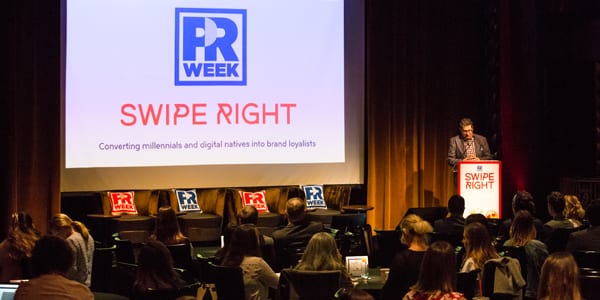 I recently had the pleasure of attending “PRWeek Swipe Right,” which featured leaders and organizations that are disrupting the business landscape by converting millennials and digital natives into brand loyalists. As a millennial, it was particularly interesting and beneficial to hear unique perspectives on harnessing the influence of my generational namesake, and how best to resonate with them as a brand. After all, U.S. millennials and Generation Z will shell out an estimated $250 billion this year.
I recently had the pleasure of attending “PRWeek Swipe Right,” which featured leaders and organizations that are disrupting the business landscape by converting millennials and digital natives into brand loyalists. As a millennial, it was particularly interesting and beneficial to hear unique perspectives on harnessing the influence of my generational namesake, and how best to resonate with them as a brand. After all, U.S. millennials and Generation Z will shell out an estimated $250 billion this year.
There were a variety of speakers and panels throughout the day focused on targeting millennial consumers and leveraging them in the workplace. I was most interested in the consumer perspective and have gathered my favorite insights from those discussions:
The Story of the CorpSumer:
Making up one-third of Americans, CorpSumers are brand activists that believe a company’s actions and corporate reputation are just as important as the products it creates and services it provides. It is a critical business imperative to target this growing segment because their attitudes and beliefs about brand reputation are so strong that they drive behavior. They look to corporate reputation to determine not only the products they buy, but also the companies they invest in, do business with and work for. CorpSumers act on their values, investing their money & loyalty in brands with values and beliefs similar to their own. They are eager to encourage or dissuade their peers from supporting a brand. 76 percent of CorpSumers have encouraged someone to buy a product or service because they wanted them to support the company that makes the product, while 74 percent of CorpSumers have encouraged someone to give up or not use a product based on a company’s reputation. In short, give these consumers a reason to believe in your brand, and they will reward you with their loyalty and activism.
Keys to Engaging Content:
If you’re a brand, you’re a media company. As such, you must constantly create content that will catch – and maintain – the eye in an age of dwindling attention spans. The message from millennial media experts was clear – brands need to serve content directly to their consumer by understanding how to reach them where they are. There is no one-size-fits-all, so brands need to understand what makes sense for them and tailor content for the platform and mindset that their customers are in. It’s also important to understand that some great ideas just take time. While news and pop-culture moments are great, you don’t always have to jump on what is happening right now – especially if it doesn’t make sense for your brand or your audience. Don’t choose something because it’s on trend; make sure it fits. You can stay on the cutting edge by knowing your audience. Slow down, make it real and make it right.
Swaying the Millennial Masses:
Social clout and clever online content creation can win the hearts and wallets of millennials everywhere, but it’s how you tap that influence that matters. We heard from a variety of millennial influencers, and the one thing that everyone emphasized was the importance of authenticity. Authenticity is the new authority. Influencers like brands that let them be themselves. In an ideal world, an influencer would write, star in and produce the content that they are creating for a brand. Millennial consumers are craving experiences and personalization. According to comedian and influencer Manon Matthews, “When an experience is connected to content, influencers can really connect with their audience and the brand. It seems more authentic. My fans want to see content that feels like me. They don’t want to feel like they’re being sold to.” On that note, the value of experiential marketing is becoming instrumental as a way to share a brand’s message while giving consumers a chance to try it. By inviting consumers to experience your brand on their time (with activations and experiences), you’re integrating your customers into your company. It’s about leveraging the consumer experience, which is key to winning over millennials.